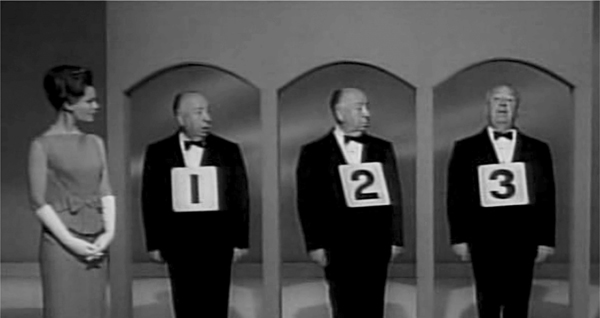|
Reviews of Recent Independent, Foreign, & Documentary Films in Theaters and DVD/Home Video

DOUBLE TAKE In an act of imaginative and half-crazy connectivity, writer/director Johan Grimonprez takes a story of Alfred Hitchcock seeing his double—his older self from the year 1980—on the set of his blockbuster The Birds and places the encounter within the context of Cold War political angst and paranoia. The alarming news footage from the time is juxtaposed with television clips from the period—including hilariously dated Folgers Coffee commercials and the director introducing his television anthology series. If nothing else I would say the movie is worth watching just to see the old clips of Hitchcock on his show. His wit was scathing but playful, and his droll delivery made it seem like you couldn’t tell if this was really Hitchcock or his on-screen persona. (His famous trailer for The Birds shows him eating a chicken.) But for all of the interspersed clips—like a scene on a game show where not one, not two, but three Hitchcocks appear—Grimonprez’s intentions are more serious, more intellectual. It’s a montage movie that jumps all over the place. At one moment there’s Hitchcock on his TV show, and the next there’s Hitchcock’s modern-day double, Ron Burrage, attending a Birds rerelease screening in 1999. Then come the TV clips of the Cold War era, with Nixon and Khrushchev having their “kitchen debate”—the Russians may have launched Sputnik but, whatever, Americans have color television. Grimonprez occasionally cuts back to the story of one Hitchcock meeting his other—1962 meeting 1980—and takes the film’s tagline, “If you see your double, you must kill him, or he will kill you,” to a strange extent. The purpose of the montage effect is juxtaposition: how does Hitchcock’s double-edged (pun intended) paranoia reflect the period when he was making his classic films and appearing on TV? Hitchcock could only do so much to scare a public that was already in a fervor about the arms race. The Cuban Missile Crisis was more than enough to put real fear into people. So what
about the story of the double? Some may find this portion of the film,
with narration by dead-on Hitchcock impersonator Mark Perry, even better
than the rest of the picture, which jumps around almost too much. And
yet what compensates the potential confusing combination of Hitchcock
and history is that it’s unendingly entertaining and absorbing.
Grimonprez uniquely picks apart pop culture and politics and
finds some connections where they may or may not lie.
Jack Gattanella
|

